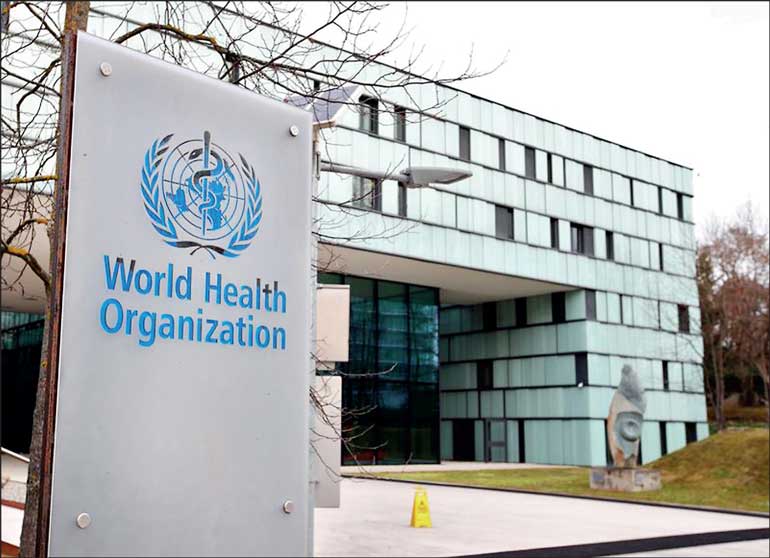Thursday Feb 19, 2026
Thursday Feb 19, 2026
Tuesday, 14 December 2021 00:00 - - {{hitsCtrl.values.hits}}

The COVID-19 pandemic has brought into stark relief the precarious state and stability of WHO’s funding
By the WHO Director-General’s Special Envoys for COVID-19
Imagine being told by the government that you need to build a new tertiary-care hospital. But then the authorities give you only 20% of the budget, little more than enough to build the foundation. You are told you will have to raise the remaining 80% through private doctors’ consults in the one wing of the building which is more or less ready.
But then you are not allowed by the authorities to organise your services as you wish; again, the authorities tell you what specialities you can offer and how to use the income, and you end up having too much money for walls and plumbing, but none for the roof, electricity or medical equipment and supplies.
That is what the World Health Organization’s (WHO’s) budgeting process has been like: less than 20% of the budget comes from the bedrock “membership dues” of the 194 countries which are the constituents and governors of WHO. WHO must go out and fund-raise the rest of its budget.
Currently, WHO depends on the goodwill of some of the same member states, who give additional voluntary funding, and other foundations and organisations. But half of that 80% raised comes with so many conditions that WHO can buy all the bricks it needs, but none of the electrical power.
Is that the way we want to see the organisation charged with helping us achieve health for all, and building a better prepared, protective and responsive world, fit for form when the next pandemic hits – or indeed so many other health challenges – financed?
Definitely not. And yet, that is what is happening. The COVID-19 pandemic has brought into stark relief the precarious state and stability of WHO’s funding. Whilst some areas of disease-specific work traditionally attract both attention and funding, others such as the groundwork necessary to allow the world to be better prepared for the next major outbreak of a pathogen or establishing the recommendations for best practice that help the world reduce the burdens of disease on their populations, may be viewed as priorities by WHO’s Member States – but less so when it comes to funding.
And surely bedrock issues such as the pre-qualification of the medicines which the UN system and its partners use to protect the world from a range of communicable disease threats and to prevent the progression of many noncommunicable and other conditions should not be dependent on chasing voluntary contributions.
We need to see that changed. We need to see the financing of WHO put on a secure, stable footing for the long-term. This will allow WHO to properly plan and budget for the array of health issues that the world faces and will face. As a result, we will all benefit.
A Working Group of WHO Member States has been meeting virtually over the past year to discuss and put forward recommendations towards the sustainable financing of the Organisation. From 13-15 December, they have their fifth and final meeting, where they will agree on the conclusions and recommendations to be put forward to the WHO’s Executive Board, which meets in January.
There is still substantial debate going on in this forum about if and how to raise the share of un-earmarked money as a percentage of WHO’s total budget. A key point in these recommendations will be that WHOs Member states agree to a step change in their assessed contributions, their “membership dues”. The increase, to be put in place over several biennia, would ensure that 50% of WHO’s biennial budget is fully funded from this pot of money.
To us, the Special Envoys of the WHO Director-General for COVID-19, giving WHO the flexibility and latitude to plan future programmes with security is self-evident. We urge Member States to agree with us and put forward strong proposals to the Executive Board that will secure and stabilise WHO’s future funding.
We all want and need to have a WHO which is able to adequately protect the world from the next pandemic, from so many other communicable disease threats, to arm the world with the tools and knowledge it needs to prevent the rise in noncommunicable diseases, to build resilient health systems and to lead the world in public health innovations that will improve the state of health of all the world’s people.
Please join us in communicating this message to your governments, to those who are meeting 13-15 December to decide the future of your health and that of your children and grandchildren.
We need a healthy WHO so that the world can be healthy.
Signed:
WHO Director-General’s Special Envoys for COVID:
Dr. Palitha Abeykoon, former Director, Health Systems Development, WHO South-East Asia Regional Office, Senior Advisor Sri Lankan Ministry of Health;
Professor Dr. Maha El Rabbat, former Minister of Health and Population of Egypt and Professor of Public Health;
Dr. David Nabarro, former Special Adviser to the United Nations Secretary-General on the 2030 Agenda for Sustainable Development and Climate Change;
Dr. John Nkengasong, Director of the African Centres for Disease Control and Prevention;
Dr. Mirta Roses, former Director of the WHO Region of the Americas;
Professor Samba Sow, Director-General of the Center for Vaccine Development in Mali.